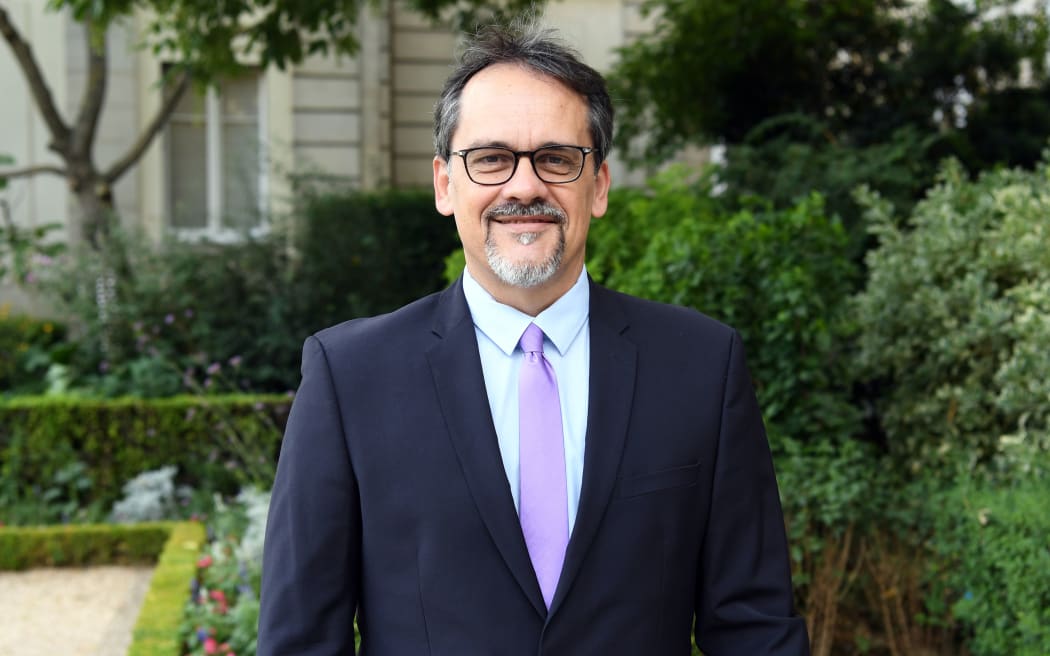Voting rights vex debate on New Caledonia’s future status
Tuesday 7 June 2022 | Written by RNZ | Published in New Caledonia, Regional

Kanak and French flags on Ouvea island. Photo: AFP
New Caledonia's restricted electoral rolls can no longer be justified and must be opened, says a local member of the French National Assembly, Philippe Dunoyer.
Pro-independence leaders, however, insist that the rolls must not be touched, fearing a change would bury the indigenous Kanaks as a minority.
Under the 1998 Noumea Accord, which is enshrined in the French constitution, voting rights in provincial elections are restricted to indigenous people and residents living in New Caledonia since the 1990s.
The provision was included in the decolonisation roadmap to ensure that migrants couldn't bolster the ranks of pro-French groups and thwart the aspirations of those seeking sovereignty.
In three referendums on independence from France between 2018 and 2021, the electorate rejected independence, but controversially Kanaks boycotted the final vote because of the Covid-19 pandemic.
However last week, France's top court rejected a challenge to the December referendum and confirmed that the result would not be annulled.
It dismissed a claim that the impact of the Covid-19 pandemic was such that the referendum outcome was illegitimate.
Although a lockdown was imposed in September and hundreds needed hospital care, the court found that the epidemiological situation improved in October and November to clear the way for the plebiscite.
With the boycott turnout was just 43 percent, but the court found that such action didn't invalidate the sincerity of the vote.

Speaking on local television at the weekend, Dunoyer said this ruling also set an end to the Noumea Accord, clearing the stage for discussions about the territory's future within the framework of the French republic.
Dunoyer is campaigning for re-election to the Assembly, standing as a candidate for an anti-independence alliance of four parties tied to French President Emmanuel Macron.
Dunoyer said foremost was the question of the electoral rolls as currently more than 40,000 French residents lack full voting rights, giving New Caledonia the strictest terms for citizenship.
He said "it was impossible to tell young, locally born people aged 19 or 20 who had never been outside New Caledonia that they would never be allowed to vote because their parents could not enrol".
Dunoyer said he would raise this with the French Senate delegation due later this month, tasked with gathering information to help draw up a new statute.
The plan, as it was announced by Paris just days after the December referendum, is to have another referendum in June 2023 on a new statute for New Caledonia.
It called on political parties to make suggestion and included a call on civil society to help prepare the document for New Caledonians to vote on.
Refusing to accept the referendum result as the legitimate outcome of a decades-long decolonisation process, the pro-independence side has so far refused to engage in this process.
It has said it wants direct talks with the French government on how New Caledonia can become independent.
In preparation of last December's referendum, the French government noted that "a lasting registration of a restricted and fixed electorate would raise difficulties with regard to France's international commitments under the International Covenant on Civil and Political Rights and under the European Convention on Human Rights".
It acknowledged that the restrictions posed the biggest difficulties legally.
This has been picked up by 'One Heart One Voice', an organisation of French citizens without full voting rights in New Caledonia.
In a submission to the French High Commission last week, the group wrote that a basic principle of the republic was that all citizens have the same rights.
It said the opening of the electoral roll should be integral to the new statute being prepared for next year's referendum, adding the planned vote on it was not subject to the terms of either the Noumea Accord or any other law.
The group warned that it would lodge all possible challenges, should the restrictions be maintained.
To correct this 'fundamental democratic distortion', it added, was a pre-condition for a common destiny and a peaceful coexistence.
To pro-independence camp has ruled out agreeing to any change of the Accord provisions.
At last month's UN decolonisation committee seminar, its delegate Dimitri Qenegei warned that France's intention to open up the electoral rolls was the ultimate weapon to drown the Kanak people and recolonise New Caledonia.
The Kanaks, he said, would be made to disappear and that wouldn't be accepted but inevitably lead to conflict.
Much hinges on how the provisions of the Noumea Accord will be interpreted.
As Noumea law professor Mathias Chauchat noted "there is a contradiction between the lapsing and irreversibility of the Noumea Accord. The two concepts cannot be made to coexist".
"Either the Accord is void or it is irreversible", he added.














































